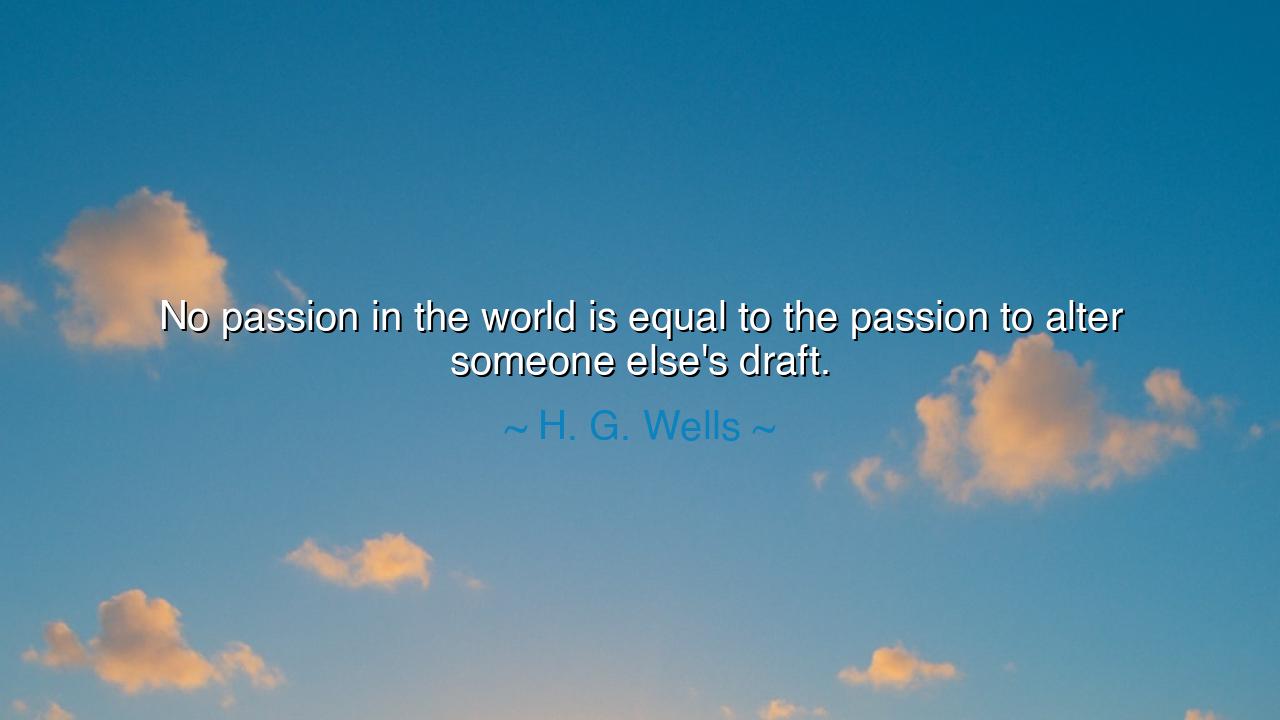
No passion in the world is equal to the passion to alter someone






Host: The room felt still, the evening air settling in as the soft light of the lamp illuminated the space. Jack sat at the table, his fingers lightly resting on his notebook, absorbed in thought. Jeeny stood near the window, gazing out at the street, considering the depth of H. G. Wells’s words.
Jeeny: “I’ve been thinking about what H. G. Wells said: ‘No passion in the world is equal to the passion to alter someone else's draft.’ It’s such a fascinating idea, isn’t it? The idea that there’s a certain urgency or intensity in wanting to change or improve something someone else has created. It almost feels like a statement about the desire for control or a need to leave a mark on something that was never ours to begin with.”
Jack: “Yes, it’s interesting. Wells is showing us that there’s something powerful in the desire to reshape or rework what others have created. Maybe it’s about ownership, or the feeling that we can do something better, or that our perspective will improve what someone else has done. There's an inherent passion in altering someone else's work—whether it's a draft, an idea, or even a vision. It’s like there’s a need to leave your own imprint on the world, even if it means changing the creations of others.”
Jeeny: “Exactly. There’s a certain excitement in reimagining something, in putting your own stamp on it. When someone creates something, there’s often a desire to take it and make it align with our own ideas or standards. Wells might be commenting on how much energy we can invest in making changes to things that aren’t even ours. It’s like the act of altering someone else’s draft is not just about improving it—it’s about asserting our own identity and influence.”
Host: The stillness in the room deepened, as if the weight of their reflection had settled in. Jack’s fingers stopped moving over the notebook, while Jeeny’s gaze softened as she considered how powerful the urge to change someone else’s work could be.
Jack: “I think it also says something about perfectionism and the pursuit of an ideal. We often feel the need to improve things because we think we know a better way. There’s a passion in correcting someone else’s work because it feels like we’re moving toward improvement, even if that means doing it at the expense of someone else’s vision. There’s an almost addictive drive to perfect things, to reshape them to fit our own ideas of how they should be.”
Jeeny: “Yes, and I think that’s why Wells chose the word ‘passion.’ It’s not just about changing something—it’s about the intensity behind that desire to alter. When we see something that isn’t quite right or that could be better, there’s a strong pull to step in and change it, to make it more aligned with our vision. That pull can be obsessive, even though the original work might already be perfectly fine. It’s almost like we can’t resist the urge to make it our own.”
Jack: “It’s true, isn’t it? That passion is something we can feel when we see an opportunity to improve, to offer our own perspective, to reshape something into what we think it could be. Whether it’s a creative project, a business idea, or even just a conversation, there’s a kind of urgency in wanting to make things fit our own frame of reference.”
Jeeny: “And I think that’s why Wells points out that there’s nothing equal to that kind of passion. It’s the urge to make something better, or to make it ours, that drives us with a fierceness we might not feel in other areas of our lives. That urge can be both creative and destructive—it’s a force that shapes things, but it’s also something that can sometimes erase the originality of the original work.”
Host: The conversation had settled into a deeper reflection, the realization that the desire to alter someone else’s draft is a complex force—a mix of creativity, control, and the quest for perfection. H. G. Wells had captured something about the intensity of that urge, about how it drives us to improve, to influence, and to leave our own imprint on the world.
Jack: “So, in a way, Wells is showing us that the passion to change others' work is human—it’s about the drive to make things better, to make them ours. But it’s also a reminder that in the process, we need to respect the originality of the work we’re altering. The passion is strong, but we have to be mindful of how we channel it.”
Jeeny: “Exactly. Alteration is a powerful tool, but it’s one that needs to be approached with care. We need to understand that the urge to change something comes from a place of wanting to improve, but that improvement doesn’t always mean taking control of the original idea. Sometimes, the best changes come through collaboration or respecting the core of the original creation, while still offering our own unique perspective.”
Host: The evening had settled into a quiet understanding, a reminder that change—whether in ideas, art, or life—is a powerful and passionate force. H. G. Wells had shown them that the urge to alter and improve what already exists comes from a place of desire to make something better, but also from a need to leave our own mark on the world. The world outside had darkened, but inside, there was a light—an understanding that passion for change is a driving force, but it must be balanced with respect for the originality and creativity of others.






AAdministratorAdministrator
Welcome, honored guests. Please leave a comment, we will respond soon